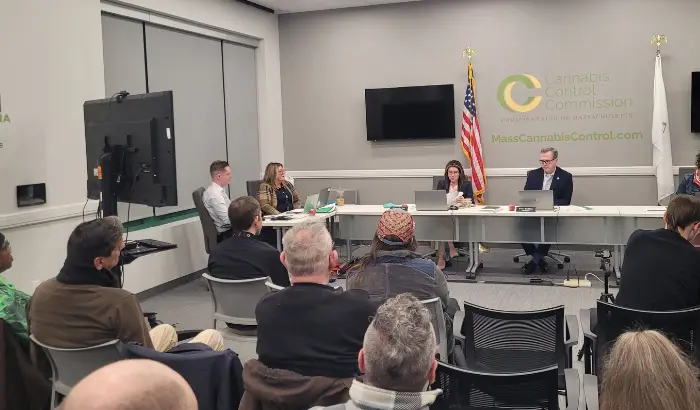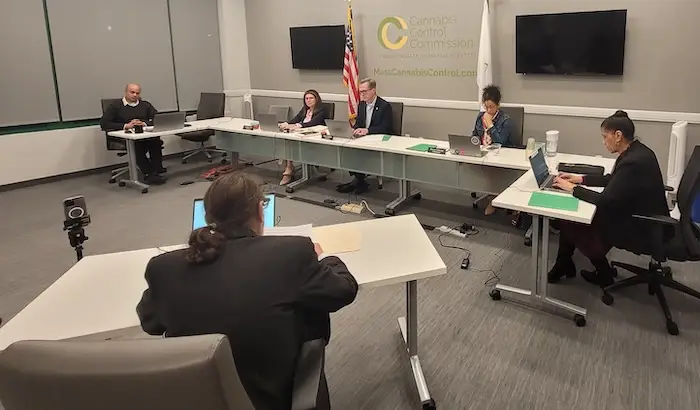
Charging a mother with committing a felony against her unborn fetus is a hazy legal theory that has yet to be challenged in Mississippi. Yet Brandy Moore faced a possible 20 years in prison.
This article was published in partnership with The Marshall Project, a nonprofit news organization covering the U.S. criminal justice system.
Brandy Moore says her 5-year-old daughter saved her life.
The rural Mississippi mother began her 2019 pregnancy bitterly. The father wanted no involvement and encouraged her to get an abortion, she said. As Moore plotted where and when to get the procedure, which was still legal in Mississippi at the time, she was using crystal meth to cope.
Then, unexpectedly, Moore had a spiritual awakening. She decided against the abortion and successfully kicked the substances.
Recently, her decision to keep her baby five years ago landed her in jail on a felony charge. Unbeknownst to her, Moore had been indicted in 2020 for aggravated domestic violence when she smoked meth during the first trimester. The indictment against the then-38-year-old had remained dormant until mysteriously resurfacing this May.
Her alleged victim was her own daughter, Remi, a blue-eyed, blond-haired child who wears an endearing snaggletoothed smile and goes by the nickname “Punky.”
Charging a mother with committing a felony against her unborn fetus is a hazy legal theory that has yet to be challenged in Mississippi. Yet she faced a possible 20 years in prison.
If that punishment sounds extreme, the local prosecutor who charged Moore wouldn’t disagree. Steven Kilgore, district attorney for the 8th Judicial District, told Mississippi Today and The Marshall Project that he doesn’t wish to send a mother in this scenario to prison, let alone on the possible 20-year sentence the charge carries.
Instead, he hopes his approach — offering women suspended sentences while they complete drug court in exchange for their guilty plea — will force the mothers to get sober, potentially preventing another drug-exposed newborn.
But Mississippi Today found three women currently serving 20-year prison sentences after Kilgore’s office prosecuted them under the same assumption — that a newborn merely testing positive for drugs at birth is proof of a violent crime, regardless of whether the baby was harmed. Each of these women failed to comply with the conditions of drug court and ended up going to prison on their full sentences.
Kilgore said he wasn’t aware they were in prison.
In fact, the majority of the women Kilgore has prosecuted under this scenario, according to a list of 11 cases he provided, have ended up in prison after failing out of the program.
When Mississippi Today and The Marshall Project informed Kilgore of these outcomes, he responded, “If something we’re doing isn’t working, we’ll try to figure something else out. It doesn’t appear that this is working.”
Advocates worry that since the 2022 fall of Roe v. Wade, which had guaranteed a woman’s right to abortion, law enforcement will target women for their behavior during pregnancy or their birth outcomes. Some local prosecutors across the nation have been charging women in these scenarios for years. But no year saw more of these criminal charges than the year following the U.S. Supreme Court opinion overturning Roe, according to a recent report from the national reproductive rights advocacy organization Pregnancy Justice. Most of the 210 cases across the country from 2022 to 2023 dealt with alleged drug use.
Mississippi Today and The Marshall Project asked Kilgore about the implications of his prosecutions on reproductive rights.
“I guess I’ve never really thought about it from that angle,” Kilgore said in mid-August. “I don’t want it to impact [the] reproductive rights conversation, but I do see how it does.”
Mississippi Today and The Marshall Project identified dozens of similar convictions across Mississippi in a 2023 investigation and in each case, the women pleaded guilty. Moore didn’t.
Her trial was scheduled for this past fall. It would have been the first case that Mississippi Today has identified that went to a jury trial.
“I’m being criminalized for deciding to keep my baby when all odds were against me,” Moore said.
Moore was working as a caretaker at an assisted living facility when she got pregnant with her daughter Remi in early 2019. She already had two children, then-aged 22 and 12. Moore said her church dropped her as a member because she was unmarried and she was leaning toward having an abortion.
At the time, a cousin needed a place to stay, and Moore let him live with her. They occasionally smoked crystal meth together. It helped her forget her problems, she said.
When Moore was nearly four months pregnant, a friend invited her to attend a revival at a local church. She used to joke about people who fell to the floor when the pastor’s palm touched their head. That’s until the preacher spoke to her that day and, she said, she was slain in the spirit.
“I remember falling, and I remember this electricity going through me,” Moore said.
It was a revelation. She would keep her baby, rekindle her relationship with God, and stop using meth.
“I felt the electricity in my womb,” Moore said. “I knew that that baby was going to be special and the baby was going to be wanted and the baby was going to be somebody.”
She told her cousin to move out. It wasn’t hard to stop getting high, she said, once she’d made up her mind.
In August 2019, Moore gave birth to her daughter. The next day, she posted a photo on Facebook of Remi wrapped in the hospital-issued, blue-and-pink-striped blanket. “True Love” was printed in cursive across the image.
Moore said she didn’t know it, but the hospital had tested her urine for drugs. The test came back as positive for marijuana and opiates, according to the sheriff’s report.
Near the end of her pregnancy, Moore said, she smoked marijuana to ease her nausea. The night before the birth, Moore had visited the hospital in severe pain, believing she was in labor, but the hospital gave her an opioid for the pain and told her to go home, according to her medical records. She also took a previously prescribed painkiller to get some rest. She said it was the only time she used an opioid during her pregnancy.
Because of the positive urine test, the hospital sent the newborn’s meconium, the baby’s first bowel movement, to a lab for further testing. Moore said she never received a visit from Child Protection Services while in the hospital, which is common following a positive drug test at birth.
But CPS did contact Moore after her discharge from the hospital. A CPS caseworker later visited Moore’s house and determined baby Remi was safe to stay there pending the results of the meconium test.
Two weeks later, the additional test came back positive for methamphetamine and amphetamine, the drug Moore admitted to using earlier in her pregnancy. Moore said the caseworker called again, but told her that CPS had chosen not to continue an investigation.
It’s not uncommon in this scenario for CPS to decline to pursue a case. Of the roughly 270 reports of infants with prenatal drug exposure that it receives each year, Mississippi CPS opens an investigation only about one-fifth of the time.
That was the last she ever heard from CPS. Remi continued to live at home. What Moore didn’t know at the time was that the sheriff’s office had opened a criminal investigation of her.
In January 2020, Moore posted another photo of Remi in a pink tutu, laying on a blanket inscribed with her name and the number five circled with a headband. “Punky is 5 months old!! She is our pride and joy and we just love her so much!” Moore wrote.
Less than a month later, a grand jury handed down an aggravated domestic violence indictment against Moore — with Remi labeled the victim. But Moore was unaware she was facing criminal charges.
The sheriff never served the warrant, and the case remained sealed. Moore eventually forgot about the whole ordeal. Kilgore and Leake County Sheriff Randy Atkinson both said they couldn’t explain why the warrant took so long to serve.
“She wasn’t hiding,” Kilgore said.
In 2021, about a year after she was quietly indicted, Moore reconnected with an old boyfriend whom she’d confided in about her past drug use and short-lived troubles with CPS. They soon married. Her new husband signed Remi’s birth certificate, and the couple had a son in 2022. But by August 2023, their arguments were mounting, and they decided to split.
In May of this year, the couple met to hash out the final details of the divorce, Moore’s permanent custody of their children and the father’s monthly child support obligations. They planned to sign the paperwork the next day, Moore said.
Later that night, while Moore was home alone with her toddler, she got a call from her soon-to-be ex. Sheriff’s officers were at his house looking for her. Afraid of being alone, and worried about what would happen to her son, she spent the night at the home of her teenage daughter’s father.
At 2 a.m., officers found her there, woke her, and took her away in handcuffs. She stayed in jail for two days, missing her shifts as a caretaker at a local child care center, before her friends could bail her out.
At her arraignment, Moore said Judge Ruby Graham told her that because of the domestic violence charge and Moore’s past drug use she must order Moore not to see her victim — then-4-year-old Remi. Graham ordered them separated for a week. The mother, wearing a jumpsuit, jail-issued slide sandals and shackles at her waist and ankles, broke down in tears.
“I’ve never been away from her,” she later said. “I knew she was OK with my ex-husband but I knew, a week goes by that she doesn’t see her mama, she was going to be hurting too.”
She wouldn’t be reunited with Remi until the following Tuesday. Two days after Mother’s Day.
Kilgore can’t remember exactly when he started prosecuting these cases. He became district attorney in 2017, but it was years before when he was working as an assistant district attorney that a Scott County sheriff’s investigator spoke to him about newborns testing positive for drugs.
At first, Kilgore said his district attorney told him there wasn’t a criminal statute that fit the offense. No state in the country currently has a specific law making drug use while pregnant a crime. Some states have used laws that define a person at the moment of conception to bring these child abuse or endangerment charges against mothers. But Mississippi has no such “fetal personhood” law.
“And I said, ‘Well, I want to indict it,’ and he said, ‘Go ahead,’ so I said, ‘OK.’” Kilgore said. “Ultimately the goal wasn’t to get a conviction upheld after a trial, which would be the goal in a murder case or something like that. It was to get help for this mother.”
Kilgore is one of a handful of local DAs who’ve had this idea. Jones County in south Mississippi began prosecuting these cases as child abuse around 2015. Circuit Court District 1, encompassing the northeast part of the state, followed suit a few years later, charging under a less severe child endangerment statute.
While there is no comprehensive way to track or identify these cases, Mississippi Today and The Marshall Project analyzed court data and news reports last year and found 44 women across Mississippi who were arrested between 2015 and 2023 for felony child abuse or child endangerment after their newborns tested positive for drugs. Nearly all of those cases came from Jones and Monroe counties.
Kilgore’s district — encompassing Neshoba, Leake, Scott and Newton counties — appears unique in its use of the domestic violence statute, as opposed to child abuse, to prosecute these cases. State Public Defender André de Gruy said he was not aware of other districts doing this.
While Kilgore’s district has produced some of the most punitive outcomes for women, the area’s rate of newborn hospitalizations due to maternal substance use is not particularly high. All four counties in his district had rates near or below the state average.
About two out of every 100 births in Mississippi result in these kinds of hospitalizations.
Maternal substance use, one factor contributing to Mississippi’s poor birth outcomes, is a public health crisis, said State Health Officer Daniel Edney.
Edney, a longtime addiction specialist, warns that pushing mothers into the criminal justice system will only deter women from seeking the medical care they need to have successful births.
“Just one woman being prosecuted is too many,” Edney said. “The vast majority of women really fight and they should be given credit for being good moms because they are fighting.”
Kilgore provided Mississippi Today and The Marshall Project a list of 11 of these cases his office has prosecuted since 2013, though he said it is not a comprehensive list.
Besides Moore, each of the women pleaded guilty to avoid the risk of a jury conviction and a long prison sentence. This is one reason that despite the legal gray area, defense attorneys and civil rights groups haven’t challenged the district attorneys bringing these cases, said Dana Sussman, senior vice president of Pregnancy Justice.
“They’re just interpreting the law the way they want to interpret the law and haven’t been challenged in that,” Sussman told Mississippi Today and The Marshall Project. “Mostly poor folks are being targeted or being charged with these crimes and they’re facing the prospect of years in prison, and separation from their children and families and so they’re going to plead to something.”
The women who pleaded guilty were given suspended sentences while they completed the 8th District’s drug court program called Fed-Up. The program has more than 20 conditions, including paying hundreds of dollars in fines and fees each month, attending weekly check-ins, abstaining from any substance, including alcohol, submitting to home searches and drug tests, and waiving medical privacy. Participants can be under these demands for up to five years.
In 2023, nearly 20% of defendants failed to complete the 8th District’s drug court — the second-highest dropout rate in the state. Most of the state’s 23 drug courts had incompletion rates below 7%.
Of the at least 10 women Kilgore’s office has sent to drug court for using drugs while pregnant, probation officers found about eight violated a condition of the program at one time or another and the local judges ordered six of them to prison. Four of those women are currently incarcerated, three on 20-year sentences and one is serving five years.
One is in drug court while another has a pending warrant for her arrest. Only one of the cases concluded with the woman’s record being expunged.
Tonya Rogillio, who works with parents in the public defender’s office, said when CPS removes a newborn at birth, that’s often the beginning of a mother’s difficult journey to sobriety and reuniting with her child.
A felony conviction — or even pending charges — makes that reunification more difficult.
“Then it’s exponentially harder for a mother to ever regain custody of her children. And part of what makes that harder is the restriction on resources she needs to get her children back, such as jobs, housing, public assistance,” Rogillio said. “And there are even some rehab facilities that don’t allow people to come to rehab if you have pending charges.”
Despite facing the possibility of a 20-year prison sentence if the case went to trial, Moore said she never seriously considered taking a plea deal.
“I’m not guilty and they’re not gonna make me believe I’m guilty,” Moore said in June.
Before this case, Moore had never faced a drug-related charge and hasn’t since. “They should save drug court for somebody that needs it,” she said.
But in the months following Moore’s arraignment, her court-appointed public defender wouldn’t answer her calls, and she struggled to find a private lawyer to take her case. One offered to represent Moore if she paid him $40,000.
Jackson-based attorney Vicki Gilliam eventually took the case. Gilliam won Trial Lawyer of the Year from the Mississippi Association for Justice in 2022 in a ceremony that fell on the same day the U.S. Supreme Court overturned Roe v. Wade, eliminating a woman’s right to an abortion and leading to bans in several states across the country. In her acceptance speech, Gilliam predicted that this change in precedent would embolden law enforcement and the courts to target women over their pregnancies in new and extreme ways.
Gilliam told Mississippi Today and The Marshall Project she was eager to defend Moore and that she’s ready to represent women in similar situations in the future.
“Every prosecutor in this state needs to know, I’ll be there,” Gilliam said.
Her help wouldn’t be required in this case.
The day after his interview with Mississippi Today and The Marshall Project, Kilgore had his first conversation with Gilliam, who described Moore’s current circumstances. The prosecutor told Gilliam he’d decided to drop the case against Moore.
The judge’s Aug. 29 order dismissing Moore’s charges stated that the state could no longer meet its burden of proof due to the age of the case.
When she learned of the dismissal, Moore broke down in tears of relief. But she said she was also almost sad about the conclusion — that she would have no public trial to challenge how the DA is criminalizing pregnant women in her community. Maybe a trial would have helped others, possibly changed some laws, she thought. That’s what she hopes telling her story might do, especially for the mothers currently incarcerated.
“I pray that they get as much of a chance to tell their story and their injustices like I have. I just pray that there will be some help for them,” Moore said.
Since then, Kilgore said his office has received several more case files regarding women who used drugs while pregnant. But after learning of Mississippi Today’s findings, he said he decided he won’t prosecute them anymore.
“I’ve reevaluated our stance on the topic and have decided not to handle these cases anymore. It was eye-opening to learn of the fate of these women,” Kilgore wrote in an email shortly before this story was published. “I believe we can all do better.”
This article first appeared on Mississippi Today and is republished here under a Creative Commons license.![]()
PARSELY = { autotrack: false, onload: function() { PARSELY.beacon.trackPageView({ url: “https://mississippitoday.org/2024/12/12/mississippi-women-prosecuted-pregnancy-drug-use/”, urlref: window.location.href }); } }

























